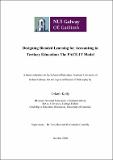| dc.description.abstract | Technological advancements have engendered evolving work roles for professional accountants as they navigate the trajectory of their careers. This has prompted calls for the transformation of accounting education at tertiary level. Accounting programme delivery must adapt to incorporate innovative teaching practices which provide students with future-focused and lifelong learning skills, in preparation for employment in a dynamic global workplace. This study set out to investigate if and how blended learning – a combination of face-to-face and online learning modes – could be designed and deployed to enhance the learner experience of introductory accounting students in tertiary education.
Cognisant of the dearth of research into accounting education practices and the disconnect between accounting education research and practice, this study aimed to advance theoretical knowledge through the use of a design-based research approach in developing theory-informed innovative teaching strategies in introductory accounting. The blended learning design implemented within this study is rooted in an emerging theoretical framework, the PACE-IT framework, which was informed by the literature and the researcher’s professional interests and experience. Underpinned by six theoretical concepts, namely pedagogy, autonomy, collaboration, engagement, interaction and technology, the PACE-IT framework evolved over the course of the study. The intervention integrated innovative and interactive pedagogies and technologies aimed at enhancing the overall learner experience.
This was a longitudinal study, taking place over three design cycles with 68 student participants, which allowed the researcher to progressively test and refine the blended learning intervention through a series of successive iterative implementations. Evaluation took place using a range of methods including surveys, interviews, learning journals, VLE activity logs, student assessment materials, think aloud protocols, discussion forum interactions and instructor observations. The data derived from these evaluations were the subject of critical analysis, informed by the PACE-IT design model, with resultant design changes implemented in each subsequent cycle.
This thesis has made a significant and tangible contribution within the field of accounting education. Firstly, the research has demonstrated, in methodological fashion, that a blended learning intervention which enhances the learning experience of students can be effectively designed and implemented for use in introductory accounting education settings at tertiary level, thereby making a meaningful contribution to learning theory in the area of accounting education.
Furthermore, this study provides a practical research output in the form of the blended learning intervention and associated learning resources, which were designed within the introductory financial accounting modules to enhance learner experiences.
Finally, the detailed narrative account of the blended learning intervention design, along with the PACE-IT design model and guidelines, may be adapted and adopted by other design researchers, educators and educational technologists to guide the development and implementation of similar learning interventions in cognate learning contexts. | en_IE |


